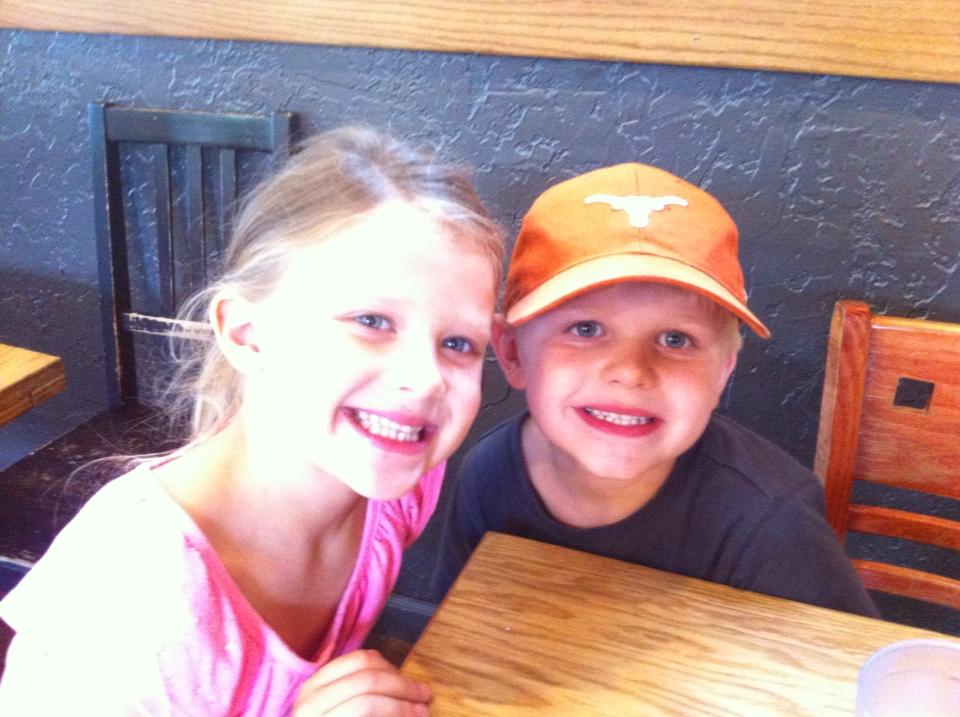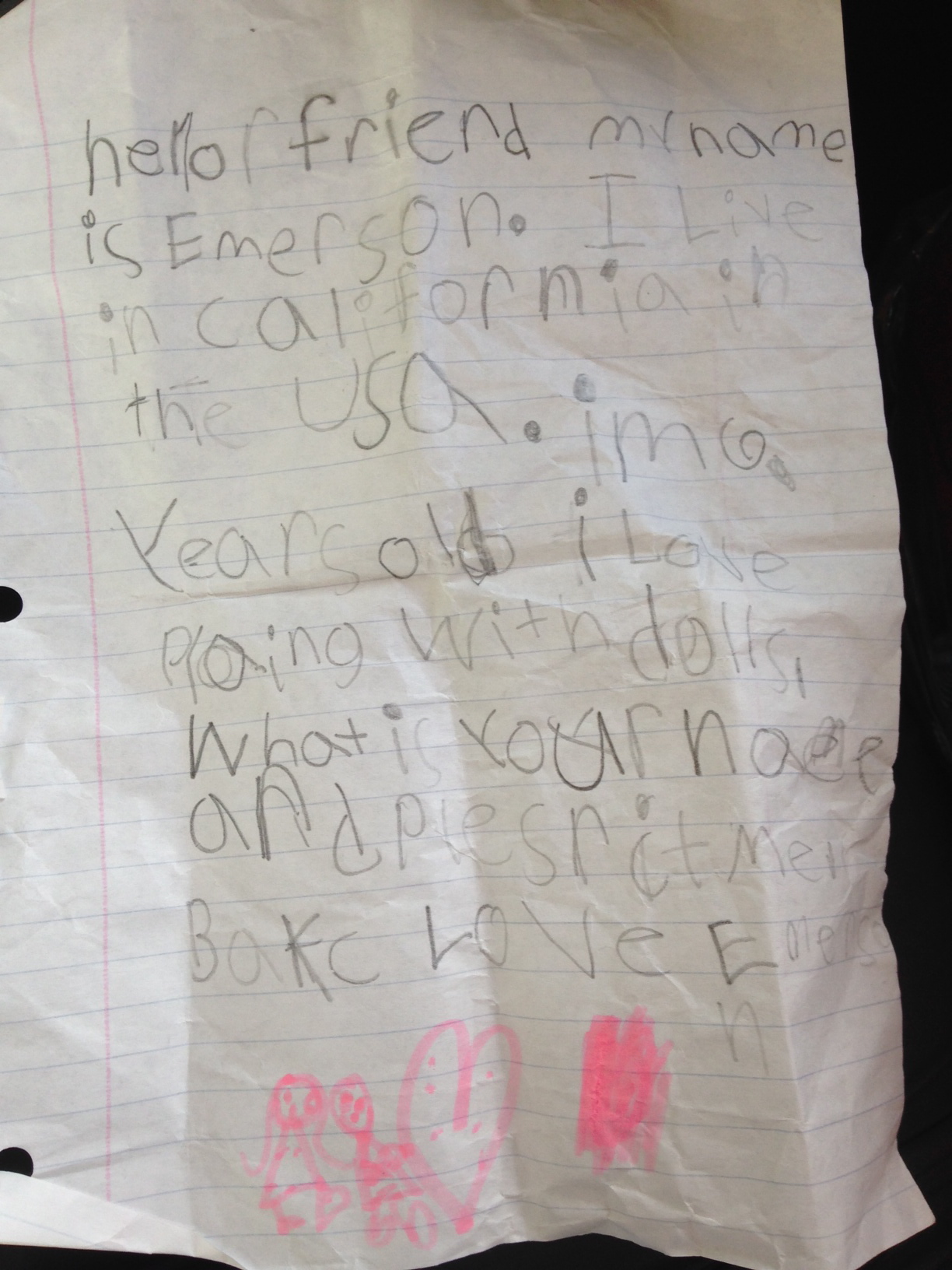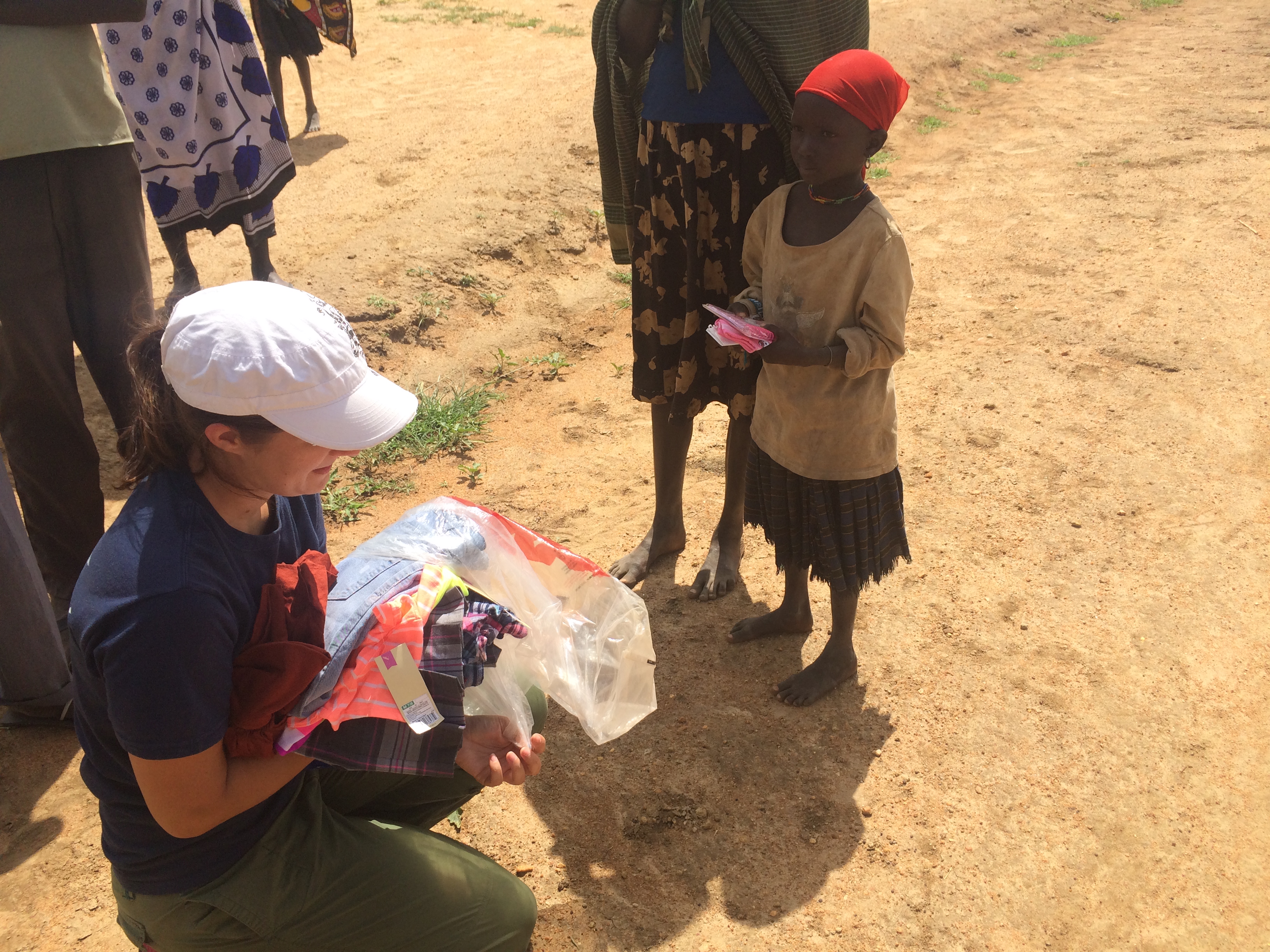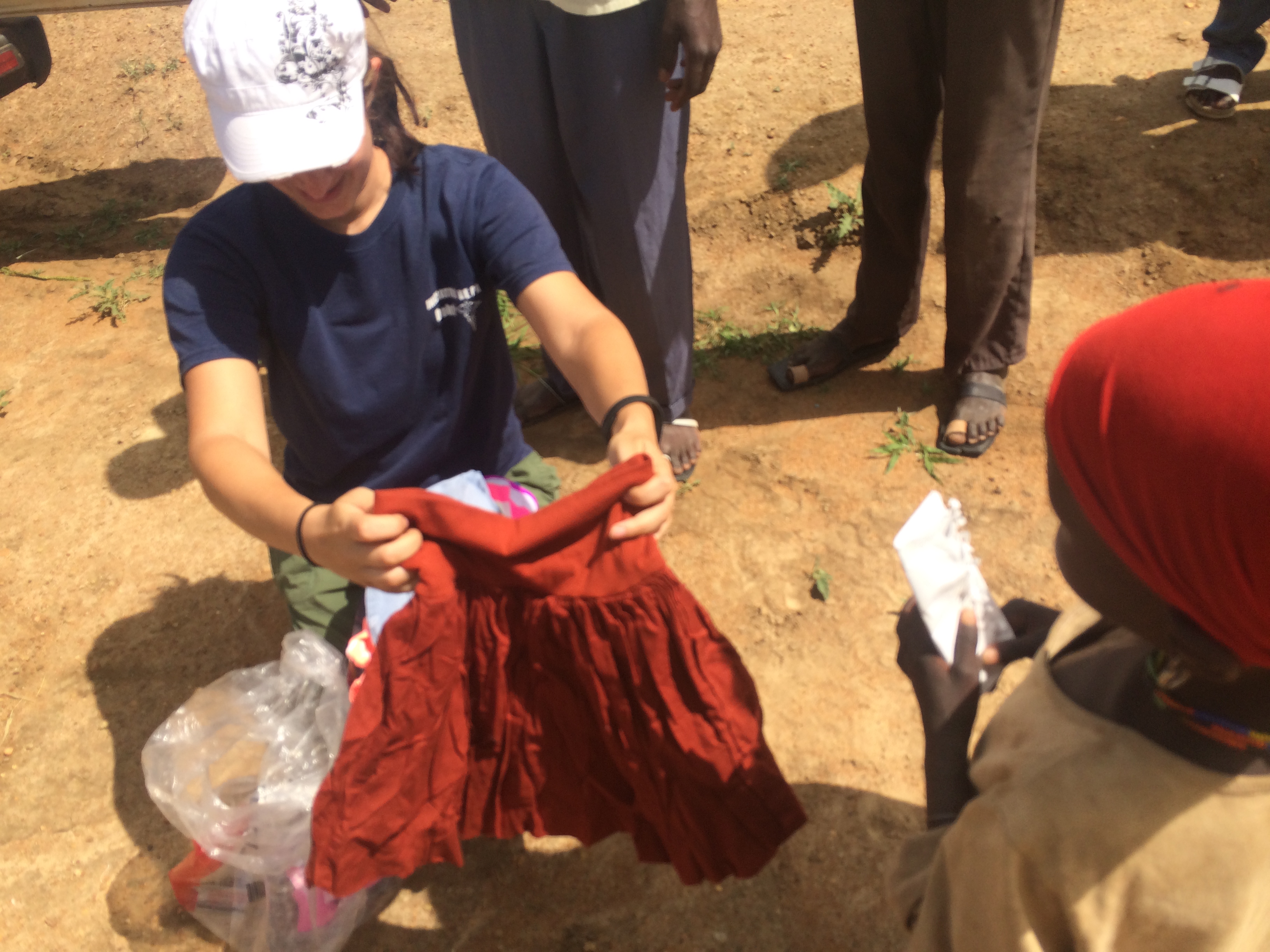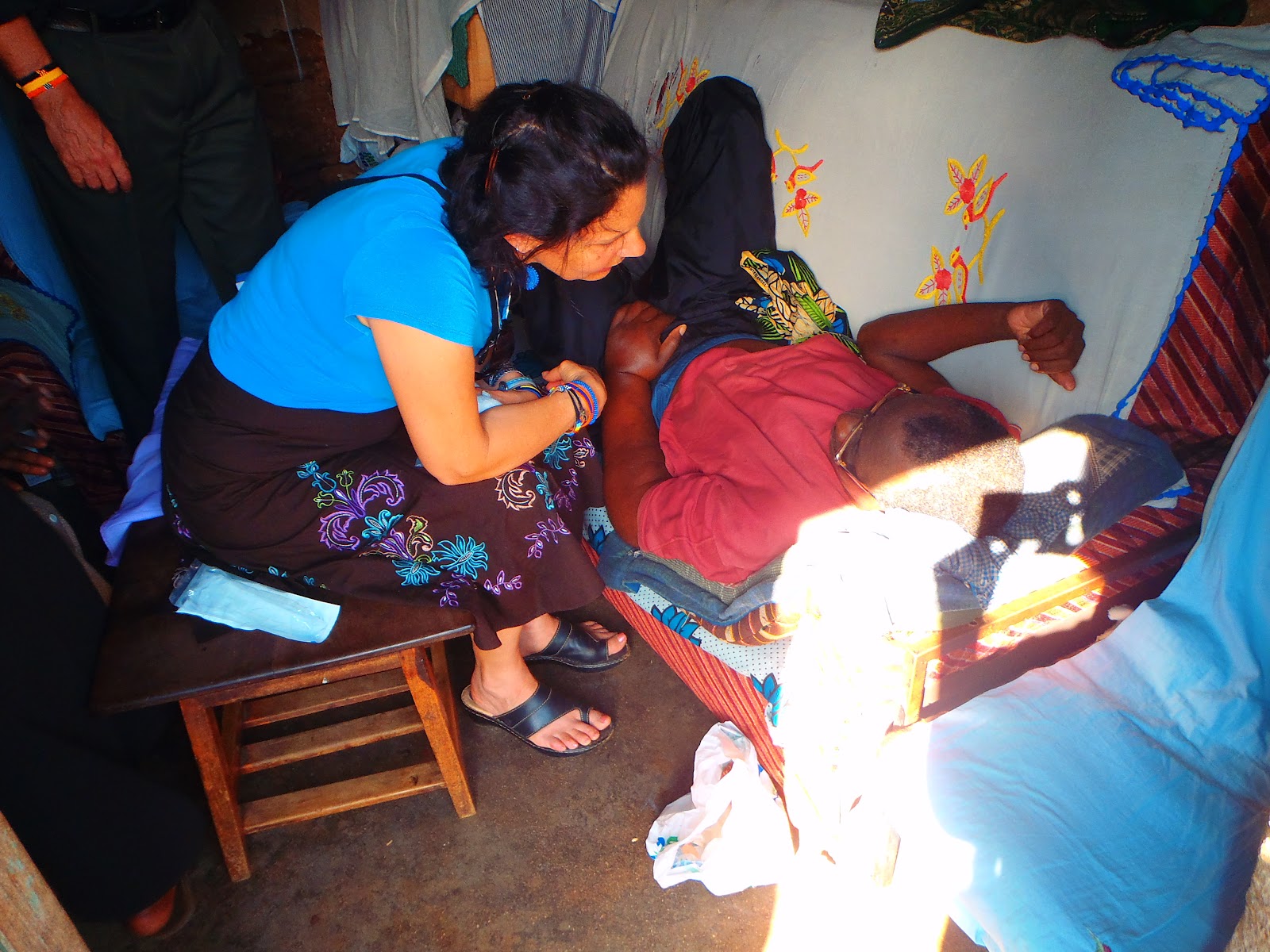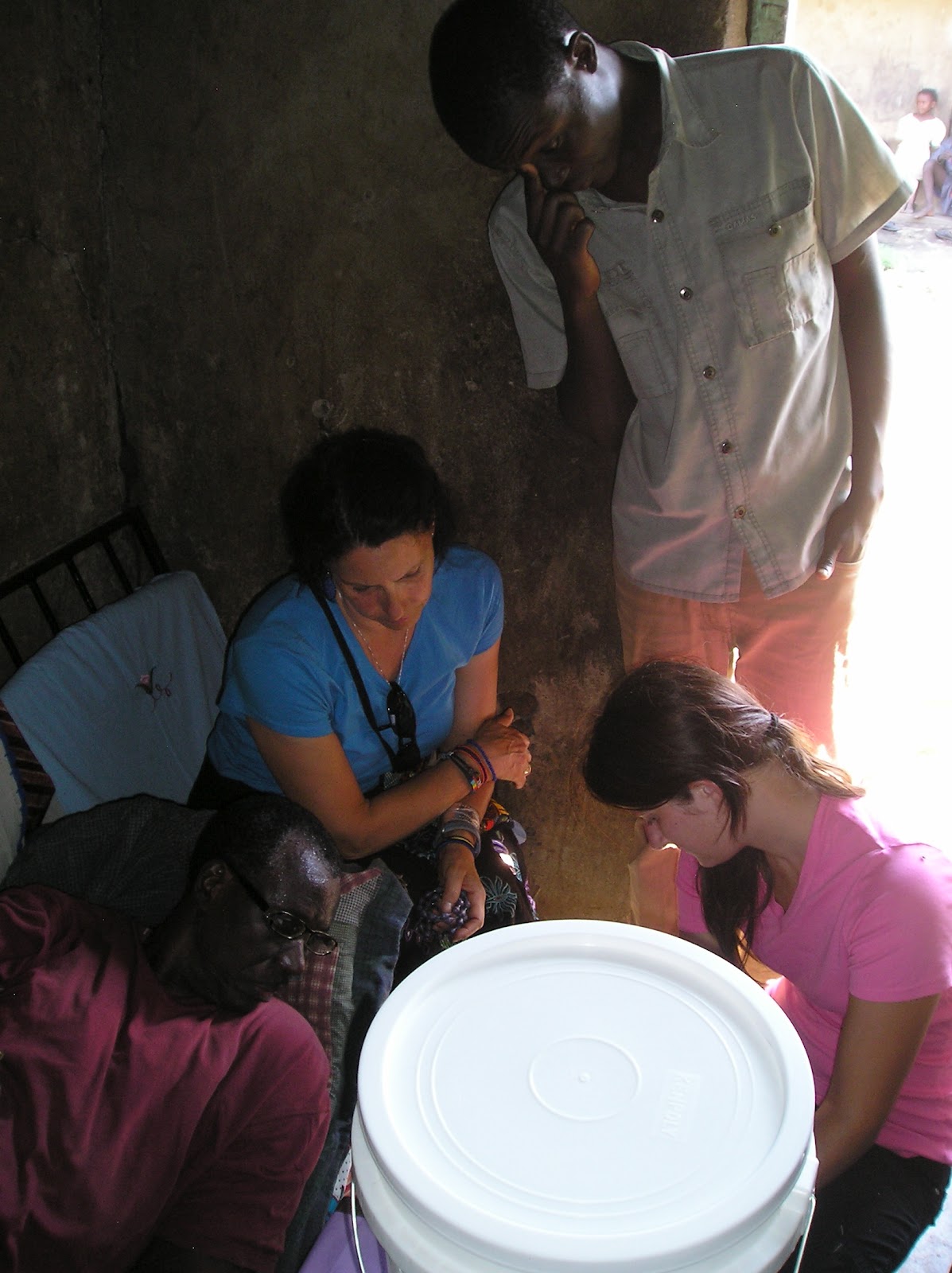
Donate
Categories
Archives
- March 2019 (1)
- January 2019 (2)
- December 2018 (2)
- November 2018 (2)
- October 2016 (1)
- May 2016 (1)
- January 2015 (1)
- September 2014 (1)
- August 2014 (1)
- July 2014 (1)
- May 2014 (2)
- April 2014 (1)
- March 2014 (1)
- January 2014 (1)
- October 2013 (1)
- September 2013 (1)
- July 2013 (3)
- June 2013 (1)
- February 2013 (1)
- December 2012 (1)
- October 2012 (1)
- July 2012 (1)
Sand Dams
Thursday, September 4th, 2014
Sand dams
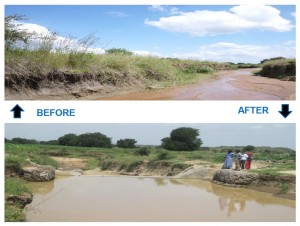
A sand storage dam (or sand dam) is a small dam built on – and into – the riverbed of a seasonal river or ephemeral stream. Sand dams effectively increase the volume of groundwater available for abstraction as well as prolonging the period in which groundwater is available. Since a large quantity of the water is additionally stored in the riverbanks the volume of water available for abstraction is considerably larger than just the volume present in the riverbed sands. Water is captured through a scope hole, hand-dug well or tube well, supplying water to nearby villagers in the dry season.
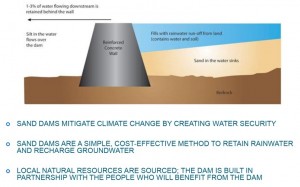
Applying conditions:
– Intermittent rivers in regions with semi-arid climates and erratic but intensive rainfall,
– Sandy riverbeds experiencing high sediment loads after heavy rain storms,
– River valleys with gradients between 1% and 2%,
– The dam location should be chosen carefully to ensure the highest storage capacity and implemented at minimum cost.
Advantages:
– Clean, good quality water due to the filtering effect of sand,
– Underground storage means limited evaporation, less chance of pollution and no breeding of surface-water disease vectors,
– During a period of serious drought, some dams still provide water,
– Water is also stored in the riverbanks. Through the increased base flow from the banks, the riverbed can be recharged during the dry season,
– Low maintenance (costs) and long life.
Here is a photo of our first Sand Dam built in North Eastern Uganda. The villagers have already used this as a resource in the 2013 dry season. Many other communities are walking to this Sand Dam to access it for water in the dry season as well. They are so grateful for this life saving change for their families and communities.
A Sweet Story – Samsoneta
Thursday, August 28th, 2014
This story is about a little girl named Emerson and a little girl named Samsoneta. I am friends with Emerson’s Mom Crystal. Crystal recently read a story to Emerson from our blog about the children in Uganda and the little girl named Samsoneta. As soon as Emerson heard the story of the needs in Uganda she ran up to her room and started going through her clothes. She wanted to share what she had with Samsoneta in Uganda. I agreed to do the exchange and Crystal sent the clothes, socks and notebook along with a letter to me for the delivery.
Uganda – July- 2014 We get to the village of where Samsoneta and her family live. I recognize her grandmother and she tells us that the little girl has traveled with her mother to a U.S. World food program distribution. She has to be weighed and measured to see how bad her malnutrition is and to determine how much food will be given to her for. In the area that we are working there is such a high number of children that are mal nourished because of lack of water for crops, diseased filled water and other factors. In the dry season many kids get 1 meal every other day. I say this only so that you can understand the situation that many of these families are in. So we thanked the grandmother and we told her that we would be back on Friday.
We came back on Friday. No sign of the little girl. She is still gone with her Mama.
We came back on Monday. No Samsoneta. I was feeling as if we were going to bring this special bag with us everyday and never see her. We only had a few days of work left in that area of Uganda.
Finally the day that we went to do the water filter check up on Wednesday in their village, there she was. Beautiful Samsoneta.
Why did she stand out to me on our first trip to Uganda in 2012? I remember kneeling down to take a picture in her village where we had first implemented water filters. Her tiny little hand reached out to mine and I had never seen such small little wrists. She was so shy but so sweet. I was able to meet her Dad, Mom, brothers and sisters. I made an inward vow to check on her every year that I came back just to make sure that she was okay.
After the water filter check up on Wednesday we took the Mom and Samsoneta down the road a bit so that we did not cause a scene. Little things such as handing out clothes etc can cause riots if there is not enough for all. So we asked the Mom if Samsoneta was in school. We got the impression that she was not. I told the Mom that our gift from Emerson was so that Samsonita would have clothes to now go to school. I am hoping that this encouraged her to allow her to go to school. Our partners Map International will check into seeing if she is attending.
We stepped out of the vehicle, I read the letter from Emerson and I showed her all of the beautiful gifts that had been sent in love from her little friend from California. She was so shy but I know how happy this made her. She is a princess as is every girl and I know she felt like it this day.
Thank you Emerson! Someday Samsonita will be able to write you back. 🙂
Hair Goes to Locks of Love in Preparation for Africa
Wednesday, July 10th, 2013
In preparation for Africa I felt compelled to make a big change in my life. I decided to chop off my hair. I felt nervous and excited all at the same time. I have had long hair for the last 5 years and I knew it would be quite a change. I had so much hair that I was able to donate it to Locks of Love, an organization that makes wigs for children that have lost their hair to chemo and other illnesses. What a wonderful day! Now I will have less hair to take care of while I am in Africa. While we will have showers where we are staying there is a chance of not having water on some of those days. There were several days last year in Uganda that we didn’t have enough water to wash our hair or take showers. Having short hair will be a lot easier to manage. So this decision became a win/win for a child in need of a wig and for my hair not to become one big dread lock while traveling in Africa. Yay!!!
CAUSES OF HAIR LOSS
Locks of Love is devoted to helping every child suffering from medical hair loss, thus we do not discriminate as to the cause of hair loss. We list the following information in an attempt to explain types of hair loss and specific needs of individual recipients.
| Alopecia Our largest number of children live with alopecia. Alopecia is an auto-immune disorder that causes the hair follicles to shut down. This disease has varying degrees and affects 4.7 million people in the United States alone. Alopecia areata affects both sexes equally and may, but does not always, progress to significant hair loss. Currently, there is no known cause or cure for alopecia. The degrees of alopecia are as follows:
Cancer
For more info go to locksoflove.org |
A Word from Pam on John’s Condition in Kenya
Tuesday, July 24th, 2012
Pam is a lady I had the opportunity to work with in my recent trip to Kenya. I am working with her, Dr. Just and Pastor David Chu Chu to implement water programs all over Kenya. She is a nurse and Deaconess with such an amazing heart to serve those in need. Here is a follow up on the condition of John. She was able to see him a third time before she left Kenya. Here is the writing from her blog.
Last night Dr. Just, Deaconess Agnes and I revisited John, the man with breast cancer. We wanted to follow up on his pain and the effectiveness of the pain medicine we purchased for him. Unfortunately, his pain level was still very high and he expressed such frustration with the local clinic “doctors” who tell him all that is wrong is that he has a wound on his chest. His left arm is so swollen that it is painful to even look at. He said to us, “I am lying on this couch dying.”
“I am in so much pain and am so weak.”
Knowing that John is likely dying from breast cancer, and recognizing that nothing is being done to help him, we decided to again utilize the services of Pastor David Chuchu and arrange for John to see a private doctor. Will this save his life? Not likely. Will it give him comfort in knowing the truth and getting comfort care at the end of his days? Well, that is our hope.
As we were saying our good-byes, John prayed for our safe journey home. He held our hands and said, “Thank you, sister. Thank you, pastor.” We said, “Thank you for allowing us to come into your home and be a part of your life. Thank you for showing us Christ in your suffering. Be blessed. Be at peace.”
Now, the other great, wonderful news about this family is this—Carrie Beth had decided this family should have a water filtration system and we delivered one before she left Kenya. We were able to talk to them about how it is working. They brought it out for us to see. They treat it like it is gold. After using it at night—for John’s shower and wound care and drinking water—they wrap it carefully in clean bags so it won’t get dirty. They are cleaning the filter every day and recognize the gift of having clean water. They were so proud of this filter and so grateful.
So, once again, in the midst of sorrow there is great joy. – Pamela Boehle-Silva
Sand Dams
Thursday, September 4th, 2014
Sand dams

A sand storage dam (or sand dam) is a small dam built on – and into – the riverbed of a seasonal river or ephemeral stream. Sand dams effectively increase the volume of groundwater available for abstraction as well as prolonging the period in which groundwater is available. Since a large quantity of the water is additionally stored in the riverbanks the volume of water available for abstraction is considerably larger than just the volume present in the riverbed sands. Water is captured through a scope hole, hand-dug well or tube well, supplying water to nearby villagers in the dry season.

Applying conditions:
– Intermittent rivers in regions with semi-arid climates and erratic but intensive rainfall,
– Sandy riverbeds experiencing high sediment loads after heavy rain storms,
– River valleys with gradients between 1% and 2%,
– The dam location should be chosen carefully to ensure the highest storage capacity and implemented at minimum cost.
Advantages:
– Clean, good quality water due to the filtering effect of sand,
– Underground storage means limited evaporation, less chance of pollution and no breeding of surface-water disease vectors,
– During a period of serious drought, some dams still provide water,
– Water is also stored in the riverbanks. Through the increased base flow from the banks, the riverbed can be recharged during the dry season,
– Low maintenance (costs) and long life.
Here is a photo of our first Sand Dam built in North Eastern Uganda. The villagers have already used this as a resource in the 2013 dry season. Many other communities are walking to this Sand Dam to access it for water in the dry season as well. They are so grateful for this life saving change for their families and communities.
A Sweet Story – Samsoneta
Thursday, August 28th, 2014
This story is about a little girl named Emerson and a little girl named Samsoneta. I am friends with Emerson’s Mom Crystal. Crystal recently read a story to Emerson from our blog about the children in Uganda and the little girl named Samsoneta. As soon as Emerson heard the story of the needs in Uganda she ran up to her room and started going through her clothes. She wanted to share what she had with Samsoneta in Uganda. I agreed to do the exchange and Crystal sent the clothes, socks and notebook along with a letter to me for the delivery.
Uganda – July- 2014 We get to the village of where Samsoneta and her family live. I recognize her grandmother and she tells us that the little girl has traveled with her mother to a U.S. World food program distribution. She has to be weighed and measured to see how bad her malnutrition is and to determine how much food will be given to her for. In the area that we are working there is such a high number of children that are mal nourished because of lack of water for crops, diseased filled water and other factors. In the dry season many kids get 1 meal every other day. I say this only so that you can understand the situation that many of these families are in. So we thanked the grandmother and we told her that we would be back on Friday.
We came back on Friday. No sign of the little girl. She is still gone with her Mama.
We came back on Monday. No Samsoneta. I was feeling as if we were going to bring this special bag with us everyday and never see her. We only had a few days of work left in that area of Uganda.
Finally the day that we went to do the water filter check up on Wednesday in their village, there she was. Beautiful Samsoneta.
Why did she stand out to me on our first trip to Uganda in 2012? I remember kneeling down to take a picture in her village where we had first implemented water filters. Her tiny little hand reached out to mine and I had never seen such small little wrists. She was so shy but so sweet. I was able to meet her Dad, Mom, brothers and sisters. I made an inward vow to check on her every year that I came back just to make sure that she was okay.
After the water filter check up on Wednesday we took the Mom and Samsoneta down the road a bit so that we did not cause a scene. Little things such as handing out clothes etc can cause riots if there is not enough for all. So we asked the Mom if Samsoneta was in school. We got the impression that she was not. I told the Mom that our gift from Emerson was so that Samsonita would have clothes to now go to school. I am hoping that this encouraged her to allow her to go to school. Our partners Map International will check into seeing if she is attending.
We stepped out of the vehicle, I read the letter from Emerson and I showed her all of the beautiful gifts that had been sent in love from her little friend from California. She was so shy but I know how happy this made her. She is a princess as is every girl and I know she felt like it this day.
Thank you Emerson! Someday Samsonita will be able to write you back. 🙂
Hair Goes to Locks of Love in Preparation for Africa
Wednesday, July 10th, 2013
In preparation for Africa I felt compelled to make a big change in my life. I decided to chop off my hair. I felt nervous and excited all at the same time. I have had long hair for the last 5 years and I knew it would be quite a change. I had so much hair that I was able to donate it to Locks of Love, an organization that makes wigs for children that have lost their hair to chemo and other illnesses. What a wonderful day! Now I will have less hair to take care of while I am in Africa. While we will have showers where we are staying there is a chance of not having water on some of those days. There were several days last year in Uganda that we didn’t have enough water to wash our hair or take showers. Having short hair will be a lot easier to manage. So this decision became a win/win for a child in need of a wig and for my hair not to become one big dread lock while traveling in Africa. Yay!!!
CAUSES OF HAIR LOSS
Locks of Love is devoted to helping every child suffering from medical hair loss, thus we do not discriminate as to the cause of hair loss. We list the following information in an attempt to explain types of hair loss and specific needs of individual recipients.
| Alopecia Our largest number of children live with alopecia. Alopecia is an auto-immune disorder that causes the hair follicles to shut down. This disease has varying degrees and affects 4.7 million people in the United States alone. Alopecia areata affects both sexes equally and may, but does not always, progress to significant hair loss. Currently, there is no known cause or cure for alopecia. The degrees of alopecia are as follows:
Cancer
For more info go to locksoflove.org |
A Word from Pam on John’s Condition in Kenya
Tuesday, July 24th, 2012
Pam is a lady I had the opportunity to work with in my recent trip to Kenya. I am working with her, Dr. Just and Pastor David Chu Chu to implement water programs all over Kenya. She is a nurse and Deaconess with such an amazing heart to serve those in need. Here is a follow up on the condition of John. She was able to see him a third time before she left Kenya. Here is the writing from her blog.
Last night Dr. Just, Deaconess Agnes and I revisited John, the man with breast cancer. We wanted to follow up on his pain and the effectiveness of the pain medicine we purchased for him. Unfortunately, his pain level was still very high and he expressed such frustration with the local clinic “doctors” who tell him all that is wrong is that he has a wound on his chest. His left arm is so swollen that it is painful to even look at. He said to us, “I am lying on this couch dying.”
“I am in so much pain and am so weak.”
Knowing that John is likely dying from breast cancer, and recognizing that nothing is being done to help him, we decided to again utilize the services of Pastor David Chuchu and arrange for John to see a private doctor. Will this save his life? Not likely. Will it give him comfort in knowing the truth and getting comfort care at the end of his days? Well, that is our hope.
As we were saying our good-byes, John prayed for our safe journey home. He held our hands and said, “Thank you, sister. Thank you, pastor.” We said, “Thank you for allowing us to come into your home and be a part of your life. Thank you for showing us Christ in your suffering. Be blessed. Be at peace.”
Now, the other great, wonderful news about this family is this—Carrie Beth had decided this family should have a water filtration system and we delivered one before she left Kenya. We were able to talk to them about how it is working. They brought it out for us to see. They treat it like it is gold. After using it at night—for John’s shower and wound care and drinking water—they wrap it carefully in clean bags so it won’t get dirty. They are cleaning the filter every day and recognize the gift of having clean water. They were so proud of this filter and so grateful.
So, once again, in the midst of sorrow there is great joy. – Pamela Boehle-Silva

